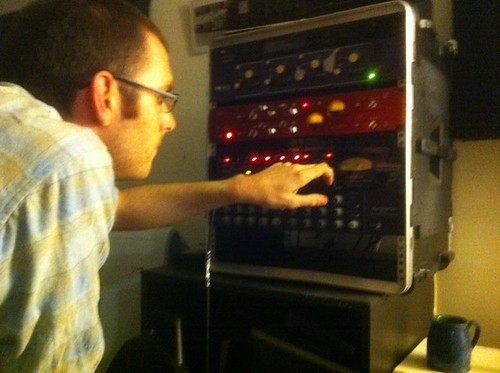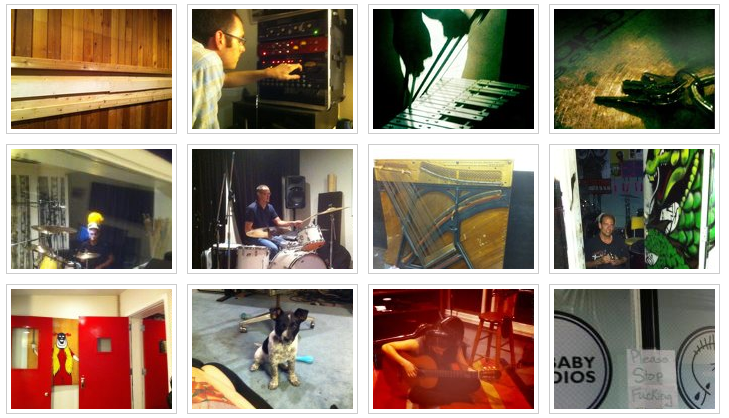
With Seattle’s Decibel Fest now in full swing, electronic music lovers all over the city are gearing up for a weekend of drum and bass, house, and techno DJ shows. It’s Seattle’s multi-venue celebration of dance music, one that shines a light on an evolving genre traditionally known for its “underground sound.” Capitol Hill has an underground music scene of its own — the enormous subterranean practice space known as CryBaby Studios. It’s a throwback for people who need honest to goodness practice space now that one person in their bedroom can produce a hit.
CryBaby’s world of sound is hidden beneath the stretch of asphalt sandwiched between Pike and Pine on 11th. It’s a labyrinth of dimly lit halls and tiny rooms decorated with string lights and sound proofing foam, usually exploding with noise: crashing cymbals, wailing guitars, drunk people.
For Leigh Stone, who owns and operates the 14,000 square foot basement space, it’s a place for “noisy bands that cannot rehearse in their Capitol Hill apartments.” A practical observation, but one with an important function here on the Hill. What better way to preserve a ‘hood’s abiding love for music of all genres than to funnel rowdy wannabe rock stars underground, far from shared walls and the frayed nerves of neighbors?
The space is open 24 hours, making it convenient and desirable for bands who work odd jobs or have opposing schedules to put in time whenever they can.
With the door nearly always open, spaces are still hard to come by. 50 rooms large, “Some bands have rented from me for over eight years. Maybe one comes open per month,” says Stone.
Most bands who’ve nabbed a space do everything they can to stay. “We’ve been at CryBaby for years now, and we love it,” says Astra, of psycho-surf rock band Atomic Bride.
“It’s a bit cramped with two bands, but you can play as loud as you want down there 24/7 so it’s totally worth it,” says Joel Katzenberger, who practices in Atomic Bride’s space with his own band.
 More CryBaby images on Facebook
More CryBaby images on Facebook
“It only costs us $55 a month per person,” Katzenberger said, who splits the rent between nine other musicians who share the unit. Despite tough economic times, struggling bands are coughing up rent for the chance to practice on their own terms, have a place to store their gear, and even record — if they can afford it.
Stone recently added a new 1,500 square foot recording studio in the space, “isolated away from the practice spaces. The recording studio is dialed in and available for musicians and vocalists of any kind to track at $25 an hour,” says Stone, adding, “We have the board that Terminator 2 was mixed on.”
Capitol Hill resident and musician Alicia Amiri is recording a new solo record in the studio.
“I’ve lived and worked on Capitol Hill for years now.” Amiri says. “I also play in a few bands and many of my friends practice or have had spaces in CryBaby. It’s definitely a Capitol Hill staple: the loud rooms, pinball machines, smoking lounge, and recording studio. It’s a clubhouse. I like it.”
It’s hard to beat a good clubhouse vibe. “Some bands have become my friends, and [I meet] new bands in the halls that I’ve seen play at festivals,” Stone says.
There’s no doubt the evolution of music involves a lot the digital, synth-oriented dance sounds heard throughout the Decibel Fest – renowned DJs Moby, Green Velvet, and Amon Tobin, to mention a few, are flying in for the occasion. Seattle needs the Decibel Fest to push these sounds from the underground to the surface, and venues like the Baltic Room and Neumos do excellent work hosting DJs and artists blazing trails in electronica’s evolving world.
But whether you’re a chart-topping DJ or a brand new band, you need two things – a love of music and a place to practice.
On Capitol Hill, that’s CryBaby. “It makes available a creative space for people to get drunk, and be creative.” Stone says. “It’s an ever-changing community but we all like the same thing – music.”
You can learn more at crybabystudios.com.


